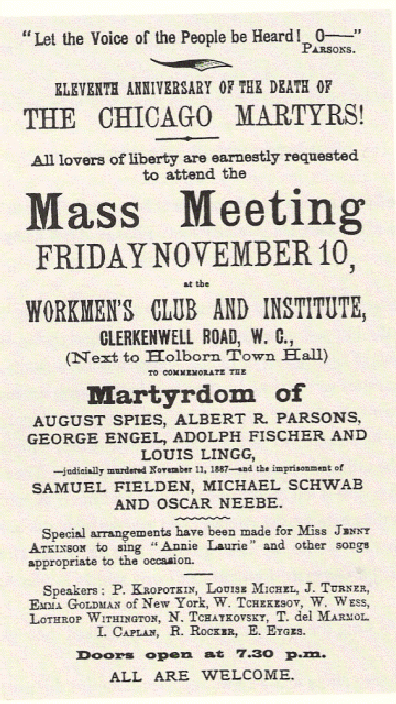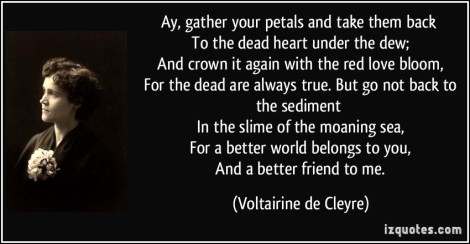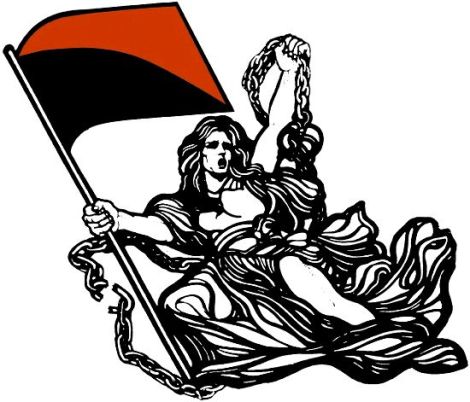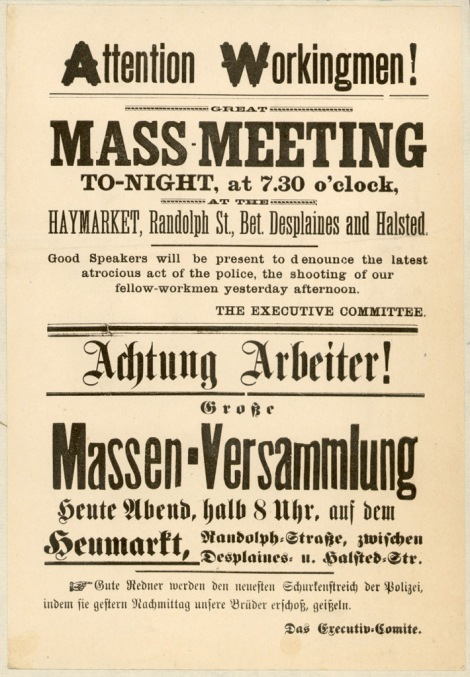Remembrance Days: Voltairine de Cleyre and the Haymarket Martyrs
In my last post, “War, Remembrance and Propaganda,” I mentioned that for anarchists November 11th is also a day of remembrance, for it was on November 11, 1887 that four anarchists were executed in Chicago, wrongly convicted of throwing a bomb at a demonstration against police violence. One of those anarchists, August Spies, cried out as he was about to be hanged, “The time will come when our silence will be more powerful than the voices you strangle today!” For decades after, anarchists the world over held tributes for the Haymarket Martyrs every November 11th. One of the most eloquent commemorators of the Haymarket Martyrs was the American anarchist, Voltairine de Cleyre. I included excerpts from de Cleyre’s writings on direct action and the Mexican Revolution in Volume One of Anarchism: A Documentary History of Libertarian Ideas. In the excerpts below, from a speech she gave on November 11, 1899, de Cleyre evokes with vivid and powerful imagery the ideas for which the Haymarket Martyrs paid with their lives. For anarchists, it is not the red or the white poppy which symbolizes the sacrifices people have made for freedom and justice, but the black rose, allusions to which are made by de Cleyre at the end of her speech.
Chicago, November 11, 1899:
Greater love hath no man known than this, that he give up his life for his friend.
We are they to whom was given that utterest of love — we, into whose ears there came a crying through the wilderness of poverty and shame and pain, a wind through the desert from the Land of Promise; voices that said: ‘It is not right that you should hunger, it is not just that you should be denied one of the glories of this earth. The world is wide: it is not reason that you should bury yourselves in a narrow den and see the earth from behind a cave mouth, while a bird that you could grasp in your hand, so, is free to cross the continent and pick its food where it lists. It is not fairness that the thing you have made should be taken from you by the hand that did not make it, and you be left with nothing but the smut and smell and memory of the torture of its making. It is insane that men should rot for want of things and things for want of men; insane that millions of creatures should huddle together till they choke while millions of acres of land lie desolate; insane that one should pour down his throat the labor of hundreds in a single night, and those hundreds always near the gateway of famine. It is criminal to believe that the mass of us are to be dumb animals, with nothing before us all our lives but eating, sleeping and toiling at the best, with all the light and loveliness of nature and of art an unknown realm of delight to us to which we may look only as the outcast at Eden. It is stupid to allege, still more stupid to believe, that you who are able to do all the hard things of this world, to burrow and dig and hammer and build, to be cramped and choked and beaten and killed for others, are not able to win all for yourselves.
‘You are not helpless if you do not will to be, you workers who labor and do not share; you need not be the ever-tricked dupes of politicians, who promise what it is not in their power to perform, and perform what their buyers order them to; you have only to learn your own power to help yourselves, only to learn the solidarity of the interests of all those who work, only to learn to trust yourselves to take your rights, by no indirection, through no intermediary, but openly on the spot where they are denied from the one who denies them — and having taken, keep. The wealth and the love and the beauty of this earth are yours, when you are ready to take them; you are no beggars at your brothers’ table: children of one plenteous board, there is enough for all and none need want.
‘Do they tell you to look to the kingdom of God? We tell you to look to the kingdom of this world; for, verily, men have looked long enough to post mortem justice, and thereby only supported another injustice, the trade in salvation, and buying and selling of heaven. They tell you there have always been rich and poor, and that what has always been always must be. It is not true that there have always been rich and poor; neither is it true that what has always been must always be. Men and the societies of men are creatures of their conditions, responsive to the pressure upon them from without, like all other things, and not only liable to change but bound to change. Every age finds its own adjustment. There have been times and places wherein all men were poor, as we should think them now, yet no injustice done, for all shared alike. There have been whole races of men with indefinite history behind them, who never knew mine and thine. They have passed away, people and system together, with the method of making a living. And Property, with all its varying forms of attendant slavery, has come into existence in response to the irresistible demand for a change to suit new methods of production — and as it had to come so it will have to go.
It is impossible it should continue; for under this plethora of products turned out by the newer methods, Property has lost its power to balance Man and the Thing. Shoved out by the tireless, flying steel hands, piled in great masses, products accumulate; the toiler at the base is flattened under the weight which Property makes it impossible to distribute. The mountain of riches crushes its creator; men and things alike waste. It cannot go on. The dead weight cannot forever press down the living energy: in the end distribution must come. Out from its burrow comes writhing a distorted, mangled, bruised, and bleeding figure —misshapen, ugly, black, covered with hell-light: suffocated, gasping, it struggles on to its feet at last, wipes the blood and sweat out of its eyes, gives a wild stare at this mountain of gold and glass and glitter it has made, catches a brief vision of the dwellers on the mountain, and with a mad cry leaps upon the thing to destroy it. He is a giant still: has he not, down there in the underground, been through the blows that temper and fires that try? Maimed and lamed, there is brawn in him yet; seared and numbed he can yet feel for a white throat. The hand that hammered the bolts has a wild grasp in it still, that lays hold and wrenches apart more desperately than it put together. The mountain is levelled, and — he begins again.
‘He is the Revolution, and he is a fool. For he will need to make and destroy, make and destroy, until he destroys the institution which makes accumulation possible. He! Why ‘he’? You, working people, you are that fool. You are he who scoops the sea and dies in the desert for a cup of water. You are he who piles that mountain of wealth, and finds nothing better to do with it when it crushes him thereafter than to set fire to it.
‘But listen, Fool, there is something better for you. This thing, Property, is not the final word of the human intellect with regard to the distribution of wealth. Beyond the smoke-edge of this frightful battle of Man and Machine, what lies? The ideal of Communism: perpetual freedom of access to natural sources of wealth, never to be denied by Man to his brother Man. Perpetual claim on the common wealth of the ages, never to be denied to the living by the dead. Perpetual claim upon the satisfactions of all common needs of the human body, never to be denied to the living by the living. Beyond the smoke wreath of the battle, what lies? Days of labor that are sweet, men and women doing the work that nature calls them to, that in which they delight — laboring at a chosen service, not one into which they have been forced; working and resting at reasonable hours, sleeping when the earth sleeps, not driven out into the darkness, like an unloved child, to turn night into day, and cripple the overdriven body by unnatural hours of pleasure stolen from sleep. Chosen toil, room, recreation, sleep — these, poor outcast animal, Man, are to be yours! Beyond the smoke-rim of the battle, what lies? The death of cities, the people resurgent upon the land, the desert blossoming into homes, the air and light of nature once more sending their strength through nerve and vein, and with it the lost power to feel the joy of existence, the realization that one is something more than flesh to feed and sleep — a creature of colors and sounds and lights, with as keen an ear for a bird’s song, as ready an eye for a tint of cloud, as any woodsman in the older days; a creature with as fine a taste for pictures and books and statuary and music, ay, and with a hand to execute them too, as any man who lives today upon your sweat, buys his library with your dribbled blood, and condenses the flesh that has vanished from your bones into the marble which adorns his alcoves.
‘Beyond the smoke-haze of the battle, what lies? Life, life! Not existence — life, that has been denied to you, life that has ever been reserved to your masters, the broad world and all its pleasant places, and all its pleasant things.’
This was the cry that came to us, and we listened and heard. We followed the crying voices through these wildernesses of brick and stone; for it was a fair hope, and who would not wish to dream it true? None but the masters, and they were afraid; they clamored for suppression of the voices; ‘Let not these work-cattle of ours get this vision of Man,’ they said, ‘else they will cease to be beasts, and we…?’
Of all the political trials that ever outraged the forms even of legal justice to say nothing of the spirit, it has remained to republics to give the worst. If the Czar of Russia wishes an example of despotism, let him look to America. Here it is that we shoot men for marching on the highway and hang them for preaching ideas.
Yes, it is all fresh in our memories — fresh as that bitter November day twelve years ago when Parsons, Fischer, Engel, Spies waited within for the signal of doom, while without a helpless mother and wife plead for the keeping of a broken promise to the heartless cordon of the ‘law’ around the sullen hole of death; plead for the last clasp of the hand that in an hour could clasp no more, the last look from the eyes that would die and never know whose promise it was that had been broken; fresh as the memory of the singing voice that went up in the night and gloom calling sweetly, ‘she’s a’ the world to me’; fresh as the memory of the lifted hand and the voice repeating,
This hand is as steady
As when, in the old days,
It plucked the already
Ripe fruit from Life’s tree;
fresh as the memory of the deathless words:
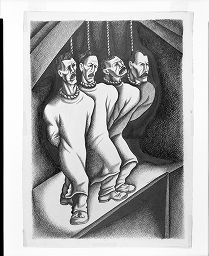 The time will come when our silence will be more powerful than the voices you strangle today.
The time will come when our silence will be more powerful than the voices you strangle today.
Long live Anarchy: this is the happiest moment of my life.
Will I be allowed to speak, O men of America? Let me speak, Sheriff Matson! Let the voice of the people be heard! O — ;
fresh as the memory of the gallows and trap and the swinging, dying bodies; fresh as the memory of him, the beautiful one, the brave, defiant one [Louis Lingg] who took his death not waiting for your hangman and from his poor mangled dying throat whispered hoarsely at the end, ‘Long live Anarchy!’
Fresh and fresh, and forever fresh, O rulers of the world, the memory of the deed you did that day! Green in our hearts as the holly at Yule — doubt not ye shall be remembered, doubt not ye shall be paid! With what measure ye mete unto others it shall be meted back unto you again. No item of the record shall escape. Shall we not recall the tricks that were done to turn the tide of sympathy which welled up, when terror and cowardice were abating, and decent human nature began to assert itself? Have we not before our eyes the picture of petition-tables overturned in the streets? In our ears the edict of Mayor Roach, ‘No public discussion of the Anarchist case, no singing of the Marseillaise’? Do we not remember the four ‘bombs’ found in Lingg’s cell conjured through the stone walls and deposited there by Anarchist magic! It is all remembered: we know you are our creditors still! Perhaps you would have interest: it is one of your institutions!
And what did you accomplish? You struck a welding blow that beat the hearts of the working people of the world together. You lifted out of the obscurity of the common man five names, and set them as beacons upon a hill. You sent the word Anarchy ringing through every workshop. You gave us a manifold crucifixion, and dignified what had been a speculative theory with the sacrificial cast of a religion. In the heart of this black slag heap of grime and crime you have made a sacred place, for in it you lopped off an arm from the Cross and gave us the Gallows.
And if it were given us to see tonight the thoughts of men made visible, we should behold the grave at Waldheim in the heart of a star whose rays shot inward from the uttermost earth. Ay, they are streaming over many waters, and out of strange lands where the English tongue is never spoken — they, the invisible phantoms that pass in the darkness, less of substance than the wind that floats the November leaf, but mightier than all the powers that ever mowed the human grass when governments went reaping! They are pouring in tonight, the intangible dreams that bind masses of men together in the bond of the ideal — a bond that ties tighter than all bonds of flesh; for it makes that one shall look into a stranger’s eye and know him for his own; shall hear a word from the antipodes, and hold it for a brother’s voice; shall ask no name nor station nor race nor country nor religion, but put himself beside his fellow-worker, needing no question since he knows that other’s labors and would be free. A surge of comradeship sweeping over the earth this night, the chant of rebellious voices singing the storm-song of the peoples, an earth-circle of reverberations from those lips that are dead — ‘Long live Anarchy’, rung out this hour from platforms in every great city in the United States, England, France, Australia; talked low in Italy and Spain and Germany; whispered in the cellars of Russia, the cells of Siberia! And murmured on the lonely islands where our prisoned comrades rot away, the words, ‘Twelve years ago today they hanged our comrades in Chicago, and the debt is yet unpaid’.
Ay, it is growing, growing — your fear-word, our fire-word, Anarchy.
Lean your ear to the wind and you will hear it, the never-dying, never finished speech, denied, choked by you that shameless day.
A warmer sanguine glows on the world’s communal flag, stamped out, stamped in, by you — the blood of the Rose of Death.
Voltairine de Cleyre
Published in Free Society, November 26, 1899
The Dominant Idea. | controappuntoblog.org
Voltairine de Cleyre Exquisite rebel:, personalità geniale e controversa


